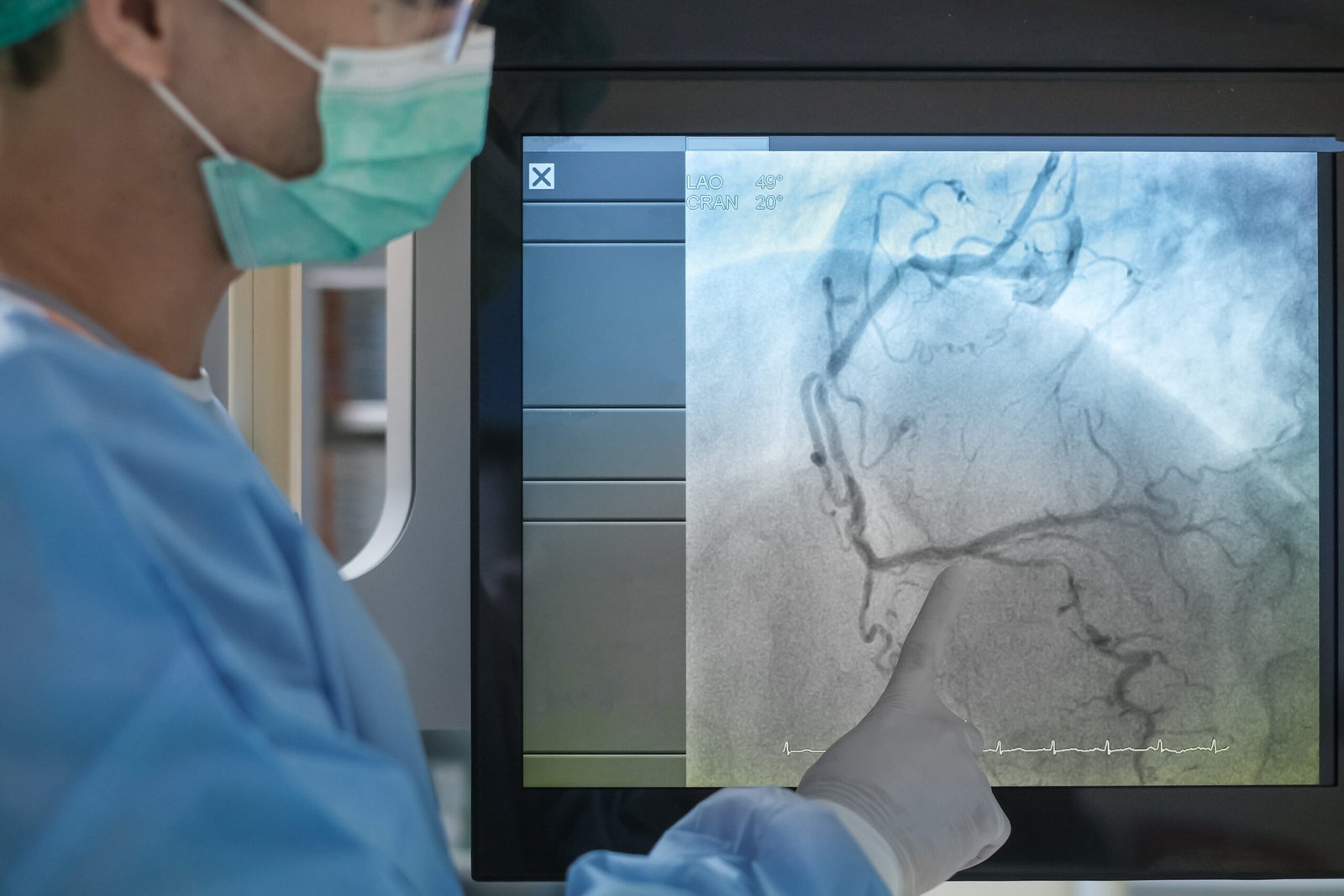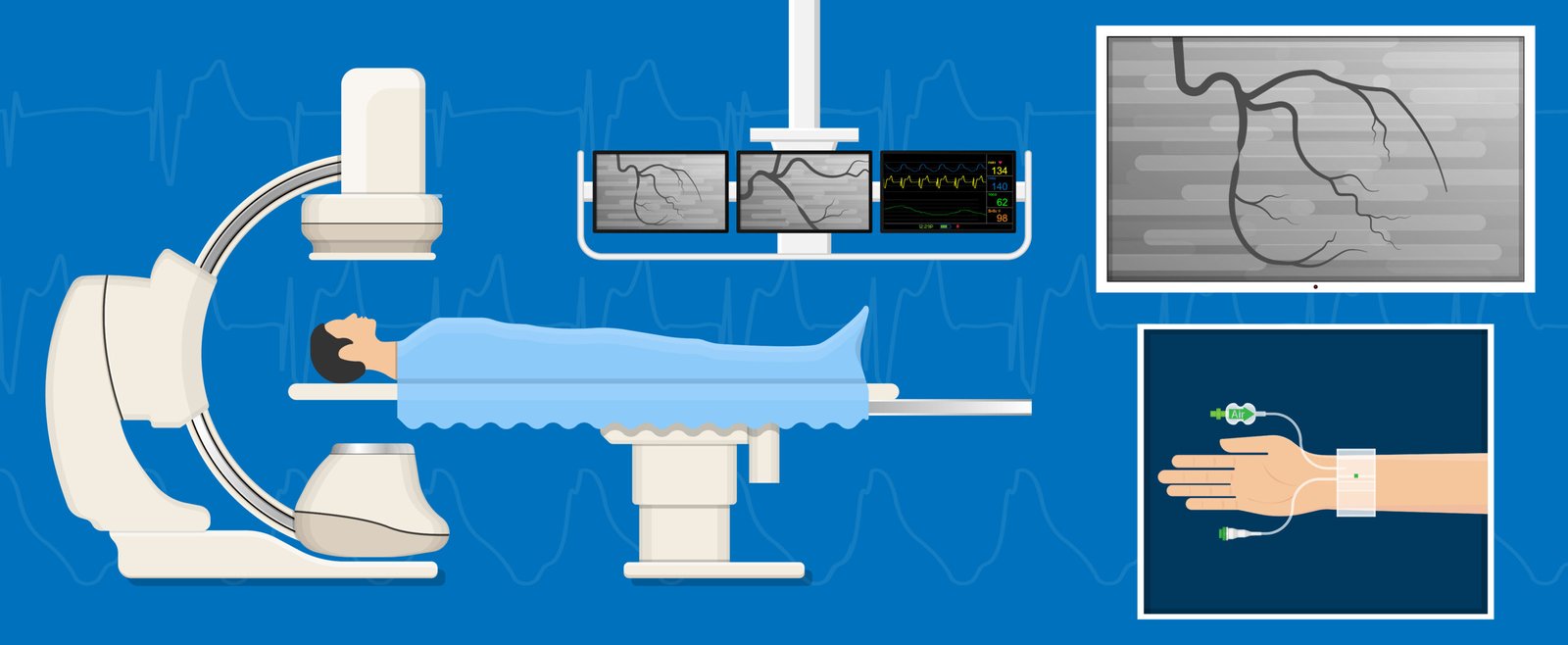
At Northern Heart Hospital, we understand the importance of heart health in maintaining overall well-being. Our mission is to provide cutting-edge cardiac care to diagnose and treat heart conditions effectively. Among our advanced diagnostic procedures is coronary angiography, a pivotal tool in identifying heart disease and planning life-saving treatments. Let’s delve into what coronary angiography entails, why it is essential, the conditions it can help prevent, the procedural journey, and how NHH is uniquely equipped to deliver this service with excellence.
What is Coronary Angiography?

Coronary angiography is a minimally invasive imaging procedure designed to examine the coronary arteries – the vital blood vessels responsible for delivering oxygen-rich blood to the heart. Using a special contrast dye and advanced X-ray technology, this procedure provides a detailed view of the arteries, helping identify any narrowing, blockages, or abnormalities.
The procedure is often recommended for individuals experiencing symptoms of coronary artery disease (CAD), such as chest pain (angina), shortness of breath, or unexplained fatigue. It is also utilised for patients who have had abnormal results from other tests, such as stress tests or electrocardiograms (ECGs).
Coronary angiography is more than just a diagnostic tool, it is often the first step towards life-changing treatments, such as angioplasty or coronary artery bypass surgery, that can restore optimal heart function.
Why is Coronary Angiography Important?
Heart disease remains one of the leading causes of death worldwide, yet many conditions can be effectively managed or prevented if detected early. Coronary angiography plays a crucial role in this early detection by:
- Identifying Blockages: Pinpointing the exact location and severity of arterial narrowing.
- Guiding Treatment Plans: Providing the necessary information for interventions such as stenting or bypass surgery.
- Assessing Risks: Offering insights into the overall condition of the coronary arteries, helping cardiologists recommend lifestyle or medical interventions to prevent progression.
In essence, coronary angiography allows healthcare providers to look inside the heart’s most vital blood vessels, providing an unparalleled level of detail that helps save lives.
Conditions Coronary Angiography Can Help Prevent
Timely coronary angiography is a powerful tool in preventing severe cardiac events and long-term complications, including:
- Heart Attacks (Myocardial Infarctions):
By identifying and treating blockages early, angiography can prevent the complete obstruction of blood flow to the heart. - Stable and Unstable Angina:
Persistent chest pain caused by restricted blood flow can be diagnosed and treated effectively. - Heart Failure:
Addressing impaired circulation early reduces the strain on the heart, preventing the weakening of its pumping ability. - Sudden Cardiac Death:
In high-risk patients, early intervention can significantly lower the chances of sudden, fatal cardiac events.
Through this preventive role, coronary angiography becomes a cornerstone in the fight against cardiovascular disease.
The Coronary Angiography Process
By breaking down each stage of the coronary angiography journey, we aim to provide you with the clarity and confidence you need to take this important step towards better heart health. At Northern Heart Hospital, you are not just a patient, you are part of a supportive, expert-led team dedicated to your well-being.
Before the Procedure
At Northern Heart Hospital, we believe that preparation is vital to ensuring a smooth and comfortable experience for every patient undergoing coronary angiography. Here’s what you can expect during this phase:
- Initial Consultation:
Your journey begins with a thorough consultation with one of our experienced cardiology specialists. During this appointment:- You will have the opportunity to share your symptoms, medical history, and any concerns you may have.
- The cardiologist will explain why coronary angiography is being recommended and how it will help in diagnosing or managing your condition.
- A series of diagnostic tests may be conducted to gather additional insights. These might include blood tests to assess your cholesterol or glucose levels, an ECG to evaluate your heart’s electrical activity, or a stress test to monitor your heart’s response to exertion.
- This is also your chance to ask questions and gain a clear understanding of what lies ahead.
- Fasting and Medication Adjustments:
To ensure accurate imaging and minimise risks:- You will be asked to refrain from eating or drinking for 6-8 hours prior to the procedure. This helps prevent complications such as nausea during the procedure.
- The cardiologist will provide tailored advice regarding your medications. For instance, if you’re on blood thinners, you may be asked to pause them temporarily to reduce the risk of bleeding. If you have diabetes, adjustments to your insulin or oral medication schedule may also be necessary.
- Informed Consent:
Before the procedure, a member of our team will walk you through the details, including:- The purpose of coronary angiography and the benefits it offers.
- The steps involved in the procedure and potential risks, no matter how rare.
- What to expect during your recovery phase. This is done to ensure you feel fully informed and confident. Once all your questions have been addressed, you’ll be asked to provide your written consent.
During the Procedure
On the day of the procedure, you will be welcomed into our state-of-the-art catheterisation laboratory. The process is designed to be as comfortable and reassuring as possible, with a dedicated team guiding you every step of the way.
- Preparing the Site:
You will be positioned comfortably on the procedure table, and the team will begin by cleaning and sterilising the area where the catheter will be inserted, this is typically the wrist (radial artery) or groin (femoral artery). A local anaesthetic is then administered to numb the site, ensuring that you feel no pain. - Inserting the Catheter:
A small incision is made at the insertion site, and a thin, flexible tube known as a catheter is gently threaded into your blood vessels. Using advanced imaging technology, the cardiologist carefully guides the catheter through your arteries to reach the coronary arteries near your heart. - Administering the Dye:
Once the catheter is in place, a contrast dye is introduced through the catheter into your coronary arteries. This dye makes your blood vessels visible on X-ray images, highlighting any areas of narrowing, blockages, or abnormalities. You may feel a brief warming sensation as the dye is injected, which is completely normal and subsides quickly. - Imaging and Monitoring:
Real-time X-ray images, known as angiograms, are captured, providing a detailed view of your coronary arteries. Throughout the procedure, the team closely monitors your heart rate, blood pressure, and overall comfort. The process typically takes 30-60 minutes, during which you’ll remain awake but relaxed. - Completing the Procedure:
Once the necessary images have been obtained, the catheter is gently removed. The insertion site is then cleaned and dressed, and pressure may be applied to ensure proper sealing and minimise the risk of bleeding.
After the Procedure
Following coronary angiography, your care continues with a structured recovery plan:
- Immediate Recovery:
- You will be moved to a recovery area, where the catheter insertion site is monitored for bleeding or swelling.
- Patients are encouraged to rest and remain hydrated.
- Resuming Activities:
- Most patients can return home on the same day or the following day. Activities can usually be resumed within 24-48 hours, though heavy lifting or strenuous exercise should be avoided initially.
- Follow-Up Care:
- A follow-up appointment will be scheduled to discuss the findings and any necessary treatment plans.
Why Choose Northern Heart Hospital for Coronary Angiography?
At Northern Heart Hospital, we combine medical expertise, state-of-the-art technology, and compassionate care to offer an unparalleled experience. Here’s what sets us apart:
- Expert Cardiologists:
Our team comprises leading specialists in cardiac imaging and intervention, ensuring you receive the best possible care. - World-Class Facilities:
Our catheterisation labs are equipped with the latest imaging technologies, allowing for precise and safe procedures. - Comprehensive Patient Support:
From initial consultation to post-procedure care, we guide you through every step of the process, ensuring your comfort and confidence. - Minimally Invasive Techniques:
We focus on reducing recovery time and discomfort, allowing you to return to your daily life more quickly. - Integrated Emergency Care:
Should an urgent intervention, such as stenting, be required during angiography, our facilities are fully equipped to handle it seamlessly.
Beyond Coronary Angiography: Comprehensive Heart Care
Northern Heart Hospital is more than just a diagnostic centre—we are a hub for holistic cardiac care.
Your heart is at the centre of everything you do, and keeping it healthy is essential. Coronary angiography offers a safe and effective way to uncover and address heart issues before they become serious. At Northern Heart Hospital, we provide world-class care with a patient-first approach, ensuring you receive the best treatment tailored to your needs.
If you or a loved one has concerns about heart health, don’t wait. Early diagnosis and treatment can make all the difference. Contact Northern Heart Hospital today to schedule a consultation. Together, we’ll pave the way to a healthier heart and a brighter future.
